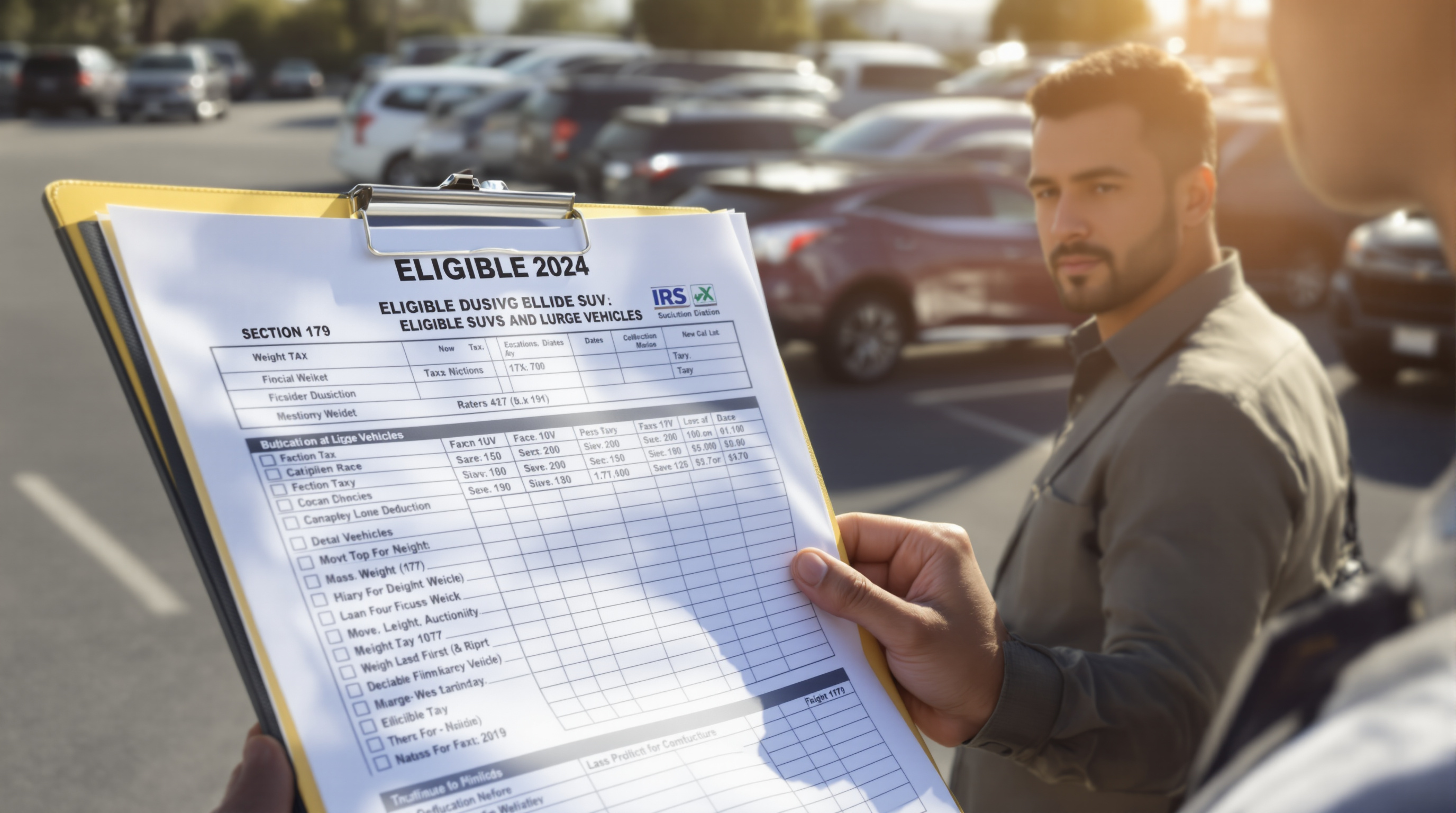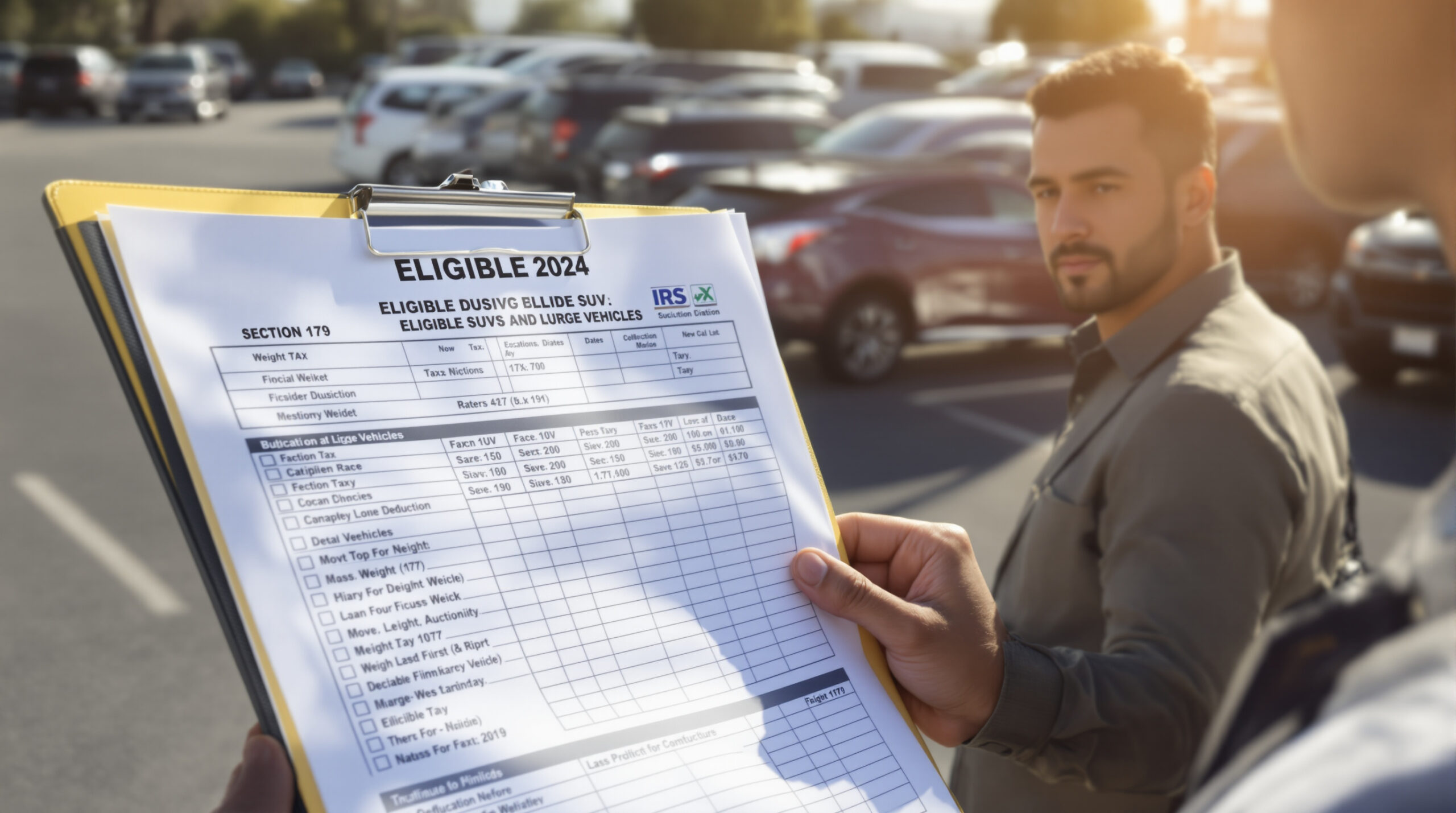The Untold Power of the 2024 Section 179 SUV List for California Owners: Write Offs That Leave Accountants Speechless
Most California business owners assume Section 179 deductions are only for the biggest fleets, but overlooking the section 179 SUV list 2024 california could quietly cost you $34,600 (or more) in wasted tax. The right vehicle, chosen with intent and documented properly, turns routine purchases into five-figure tax savings—often with less effort than most realize.
Quick Answer: For 2024, the IRS allows California businesses to immediately deduct up to $28,900 on most SUVs, trucks, and vans over 6,000 pounds under Section 179, as long as the vehicle is business-used and listed on the qualifying 2024 IRS table. Owners must document business usage and place the vehicle in service during the tax year. Full federal and state rules apply—mistakes can trigger FTB audits, missed savings, or costly recapture taxes. (See IRS Publication 946 for guidelines.)
This article decodes what vehicles qualify, how California tax laws treat Section 179 for SUVs in 2024, and—most critically—how to sidestep audit traps. We’ll walk through practical examples and show what real owners saved by picking the right SUV at the right time.

How Section 179 Turns SUVs into Giant Tax Deductions in 2024
For the 2024 tax year, Section 179 allows businesses—including sole proprietors, LLCs, and S Corps—to write off up to $1,220,000 in qualifying equipment. But for SUVs and vehicles between 6,001 and 14,000 lbs, a special sub-limit applies: $28,900 per vehicle (most years, this number changes; see IRS Publication 463 for the latest).
Why only certain SUVs? For decades, taxpayers abused Section 179 by expensing $70,000 Escalades and G-Wagons as “business trucks.” The IRS set a stricter limit on passenger SUVs — but left a wider door open for commercial vehicles, trucks, and vans that actually work.
- SUVs/Vans/Trucks Over 6,000 lbs: Deduct up to $28,900 under Section 179 in 2024
- Vehicles Over 14,000 lbs: May be fully expensed if designed for cargo or commercial use
- Passenger vehicles under 6,000 lbs: Subject to much lower expensing caps (typically below $12,200/year)
Example: If you purchase and place a qualifying $72,000 SUV into service on June 9, 2024, and it’s used 80% for business, you could deduct $23,120 (80% x $28,900) up front—plus bonus depreciation or MACRS on the remainder.
Your 2024 California Section 179 SUV List: What Really Qualifies?
Here’s the bottom line: The official section 179 SUV list 2024 california is determined by curb weight, use case, and design, not sticker price or luxury level. Typical qualifying vehicles in 2024 include:
- Chevrolet Suburban, Tahoe, and Silverado 2500/3500
- Ford Expedition, F-250/F-350 Super Duty
- Toyota Sequoia, Land Cruiser, Tundra
- Dodge Durango, Ram 2500/3500
- GMC Yukon XL, Sierra 2500/3500
- Nissan Armada, Titan XD
- Lexus LX570, GX460, and similar SUVs above 6,000 lbs
To claim the deduction, the vehicle must be:
- Used more than 50% for bona fide business purposes
- Registered in the business’s name (not just personal)
- Placed in service by December 31, 2024
- Not subject to “listed property” entertainment or personal use exceptions
Pro Tip: Keep proof of business usage and mileage logs—California’s Franchise Tax Board often requests them when auditing high-value Section 179 claims.
KDA Case Study: LLC Restaurant Owner Captures a $24,600 Deduction in 30 Days
“Nina,” a Sacramento restaurant owner (LLC), bought a $68,000 Chevy Tahoe in July 2024. Her CPA (not affiliated with KDA initially) was hesitant about aggressive deductions for vehicles. KDA stepped in, reviewed her books, and confirmed the Tahoe was used 90% for business, shuttling supplies and contractors. We documented her mileage, matched her calendar to business purpose, and helped her register the vehicle under the LLC. Nina claimed $25,920 (90% x $28,900 limit) in Section 179 deduction, plus $3,882 in first-year bonus depreciation. Her out-of-pocket after-tax cost for the Tahoe dropped by nearly $24,600. Our strategic review cost $2,400 and more than 10x’d her ROI in year one alone—while keeping her FTB audit-proof.
Ready to see how we can help you? Explore more success stories on our case studies page to discover proven strategies that have saved our clients thousands in taxes.
Why Most Business Owners Miss or Misapply Section 179 Vehicle Deductions
Thousands of California LLCs and S Corps buy vehicles every year, but many either don’t maximize the deduction or accidentally set themselves up for an IRS slap. The most common mistakes?
- Depreciating vehicles under standard MACRS instead of expensing upfront
- Failing to prove over 50% business use (no logs, calendar, or receipts)
- Registering vehicle personally instead of through the business EIN
- Assuming all SUVs over $50,000 qualify (weight, not price, is the test)
- Missing out because of bonus depreciation confusion (Section 179 first, then bonus)
Red Flag Alert: California FTB aggressively audits high-dollar section 179 entries with SUVs or “mixed-use” vehicles—especially when business mileage is thin or the business is service-based. Every deduction needs airtight documentary evidence. If you are unsure, see our bookkeeping services for compliance help.
FAQs: Section 179 SUV List 2024 California
How do I know if my SUV qualifies for Section 179 in 2024?
Check the manufacturer’s specifications. The IRS and most state agencies look for a Gross Vehicle Weight Rating (GVWR) over 6,000 lbs (found on the inside of the driver’s door or VIN lookup). Be prepared to show business receipts, logs, and registration in the business’s name to the IRS or FTB if they ask for proof. The business usage test is the most frequent reason for IRS adjustments—don’t skip this step.
Can I deduct the full cost of the SUV if used 100% for business in California?
No. Section 179 has a $28,900 federal per-vehicle limit in 2024 for most SUVs used in business; California generally conforms if the vehicle is used for qualified business activity and proper documentation is provided. The remainder of the SUV cost is eligible for bonus depreciation (interestingly, bonus depreciation is phasing down each year through 2027, so act fast).
What about passenger vehicles or luxury cars under 6,000 lbs?
Section 179 and regular depreciation have much lower caps for these. Typically, you’re limited to less than $12,000 in first-year deductions, and documentation is even more critical. Don’t try to game the system by buying a “luxury sedan”—the rules are much stricter and the potential for audit is higher. See IRS rules on vehicle deductions for more.
Do leased vehicles count?
Generally, only vehicles owned by the business and placed in service (not leased) qualify for Section 179 expensing. Leased vehicles may be deductible in a different way as a business lease expense, which can still provide significant annual write-offs for California businesses.
The 2024 Deadline Trap Most Owners Miss: Placing the Vehicle in Service
You must place the vehicle in service — meaning, it is available for business use — before December 31, 2024 to claim the deduction for this tax year. Delivery delays, registration hiccups, or last-minute dealership backlogs can cost you thousands if missed by even one day.
Plan purchases before the holiday rush, allow time for registration, and keep every document handy. The California Franchise Tax Board follows up on large, late-December vehicle purchases.
Action Steps to Implement the Section 179 SUV Strategy
- Review the latest IRS Section 179 vehicle eligibility lists before purchase
- Get manufacturer’s weight specs in writing (Sales contract, window sticker, or VIN lookup)
- Register the vehicle in your business’s legal name/EIN
- Document your business use (mileage logs, written summaries, service records)
- File Form 4562 with your business return to claim deduction
Pro Tip: If your taxable business income is low, you may not be able to use the full Section 179 deduction this year—but you can carry unclaimed portions forward. Discuss this with your adviser or see our tax planning solutions.
What If You’re Audited Over a Section 179 Vehicle Deduction?
If the IRS or FTB flags your return, stay calm. Common audit triggers include inconsistent business usage records, lack of supporting registration, or claiming deductions on the wrong forms. Have your paperwork in order, answer all written requests directly, and avoid over-explaining.
KDA’s audit representation team has handled dozens of these for California owners, often resolving disputes in under 30 days and minimizing or eliminating penalties. If you receive a notice, our audit defense service is ready to help.
Will Section 179 Rules Change for 2025 and Beyond?
The Section 179 SUV rule is reviewed annually. The $28,900 cap, bonus depreciation allowances, and vehicle eligibility list are all subject to phaseouts as Congress updates tax law (especially after 2024). California generally conforms, but not in every case—be alert for decoupling of state and federal rules after 2024.
This information is current as of 10/12/2025. Tax laws change frequently. Verify updates with the IRS or FTB if reading this later.
How to Coordinate Your Section 179 Deduction with Other Strategies
Pair your Section 179 vehicle strategy with depreciation planning, entity structuring, and annual tax forecasting to avoid hitting income limits or missing deductions. Small businesses who combine Section 179, bonus depreciation, and proper LLC/S Corp setup routinely save $25K or more in a single year—when guided by professionals who understand California business compliance rules.
For a deeper breakdown of business tax strategies—including optimal entity selection, payroll setups, and advanced expensing—see our California S Corp strategy hub for 2025.
Book Your Section 179 Tax Strategy Session
Don’t leave five-figure SUV deductions to chance. If you want personalized advice on which vehicles qualify, how to capture the deduction, and how to stay fully audit-proof, reserve your one-on-one tax strategy session today. KDA’s team has helped California owners save millions, and your bottom line could be next. Click here to claim your spot now.




